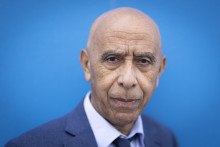I first contacted Kisanet Molla to talk about Deamat, a start-up that she was running while studying Spatial Engineering at the ITC Faculty. We had a nice little chat about why she started this service to help Ethiopian farmers. She seemed happy and busy, like a normal UT student. Until I asked how the company was doing now. ‘We had to pause all our activities because of the war,’ she replied. And so the story of a promising entrepreneur quickly turned into a tale of danger and armed conflict.
Raised by siblings
Kisanet was born and raised in Tigray, a northern region of Ethiopia currently at war. She comes from a large family of eight siblings, who sadly lost their mother at a young age. ‘I was seven when she died,’ she says. ‘My dad was not really involved. The orphanage wanted to take me, but my siblings didn’t allow it. They wanted us all to stay together. We were a very low income family, but my sisters and brothers always made sure we had enough food – and that we kept up our grades at school. My siblings did everything to make me feel like we had it all. They were kids without parents themselves but they took care of us. It always amazes me.’
Throughout the conversation, Kisanet becomes emotional every time her family is mentioned. Understandably so. In fact, her sister was due to deliver a baby on the day of the interview, but with local hospitals not functioning properly and Kisanet’s sister needing special medicine, the UT student cannot hold back her tears. ‘I feel so helpless. I can’t even imagine. She is pregnant, my other sisters have babies too. I mean banks were closed for a long time, I wondered if they even have food to eat at home. I saw a picture of my sister recently and she looked so different. I could see that she is not okay. I don’t know how they are, but I know they are not safe.’
Tigray war
The Tigray War is an ongoing armed conflict that began around midnight of 3–4 November 2020 in the Tigray Region of Ethiopia. It is being fought between the Special Forces of the Tigray Regional government, and the Ethiopian National Defense Forces (ENDF). The offensive against Tigray was ordered by Prime Minister Abiy Ahmed. His government has declared the Tigray People’s Liberation Front a terrorist group, and there have been reports of thousands of ethnic Tigrayans around Ethiopia being held in detention without charge. An estimated 1 million to 2 million people have been displaced from their homes, and more than 63,000 have fled to Sudan. Famine has hit at least 350,000 people in northern Ethiopia’s conflict-ravaged Tigray region, a starvation calamity bigger than anywhere else in the world at the moment, the U.N. and international aid groups said.
Source of information: New York Times
Entrepreneurial spirit
When we circle back to her childhood and studies, Kisanet begins to beam again. She enjoys talking about where she comes from. ‘I studied Civil Engineering at the University of Gondar. I got recognition for my good grades. After graduation I got a job in the capital, but it was not for me. I didn’t like doing only what I was told. I wanted to follow my own ideas. I’m not so much of a “yes” person, I always challenge things. I stand up for what I believe in.’
‘I stand up for what I believe in’
After exploring various options, including another Master’s degree, Kisanet ended up quitting her paid job and started working in an incubator for young entrepreneurs in Ethiopia. It was at this point that she came up with Deamat, an online platform that connects farmers directly to consumers. ‘In Ethiopia, farmers from rural areas cannot transport their produce to big cities directly. There is a whole chain of actors in between, which means the farmers lose money and the products are more expensive for the consumers. We personally travelled to talk to farmers, often on foot, and they were very eager for a solution. We had agreements with the Science and Technology of Tigray and with the agriculture development agencies. We bought a motorbike for deliveries, we were in a process of setting up warehouses – but then the war broke out.’

In the war zone
This happened while Kisanet was in Enschede, studying and finishing her Master thesis. ‘I was passionately in love with Deamat,’ she says. ‘Which is why I wanted to get a degree that could also help the company.’ And why she ended up choosing Spatial Engineering at ITC. ‘As part of my thesis, I’m using remote sensing technologies to map small farming clusters. Knowing their exact location can make them more accessible and contribute to food security. I’m hoping we can use this knowledge to improve the platform.’ The thesis, studies and her internship at the World Bank are on the back burner for the moment, though.
‘On the 4th of November 2020 I woke up and I could not reach my family’
‘When I was growing up, the country was at peace and I never expected that a war would break out,’ says Kisanet. ‘But on the 4th of November 2020 I woke up and I could not reach my family.’ She posted a message on Twitter, asking if anyone knew what was happening. She received a reply saying that ‘all connections were shut down in Tigray’.
‘That is when I realized we were at war. And that my siblings were in danger. I could not reach them. It was impossible. I could not eat, I could not sleep. My friends had to come over to take care of me. I could not focus on my thesis. I was very active in the African study association AFRISA and in organizing Create Tomorrow, but I had to drop everything,’ Kisanet pauses to catch her breath. ‘The stress of school is enough as it is. Now imagine that you can’t talk to your family, you don’t know if they are alive, if they are safe.’

After more than a month of no communication, Kisanet managed to get in touch with her siblings in the capital. Her family in rural areas remains unreachable as fights in Tigray continue. ‘I try to talk to my brothers and sisters every day. Yet, I don’t know how they are really doing. Phone lines in the capital still work, but they are being monitored and they might get shut down as well. My siblings always say that they are fine and they worry about me, because I’m here alone. But they are the ones in the middle of the war!’
‘These are the people you’d do anything for, but there is nothing you can do to save them’
In between sobs, Kisanet continues to tell her story: ‘I know my little brother and the children are scared. I don’t want them to feel trapped. You are in a free world, but someone tells you if you can or cannot live. It is awful. The children tell me about planes, how they run to hide if they see them flying over. They cry when they pass because they don’t know what will happen. It is so sad because these are the people you’d do anything for, but there is nothing you can do to save them,’ she cries and apologizes for ‘being emotional’.
Tigray
The main reason neither Kisanet nor her family are safe, says the UT student, is simply because they are Tigrayan, a minority ethnic group with its own culture and language. ‘I was not paying any attention to the Ethiopian politics, but I woke up when the conflict started. After the current prime minister took over, I know that Tigrayans all over the country were being discriminated. But it was hard for me to image it would go this far. It is just so very sad.’
‘I hope the war will end soon and I can go back’
Kisanet is in the very last semester of her studies, but she doubts that she can return to Ethiopia any time soon. ‘That would be impossible right now,’ she says. ‘But I’m dedicated to helping Tigray from here. I have been advocating for the war to stop with fellow Tigrians and people who are against war. I don’t understand the mindset of people who justify war for any reason. Life is so precious. I hope the war will end soon and I can go back and help rebuild Tigray.’








